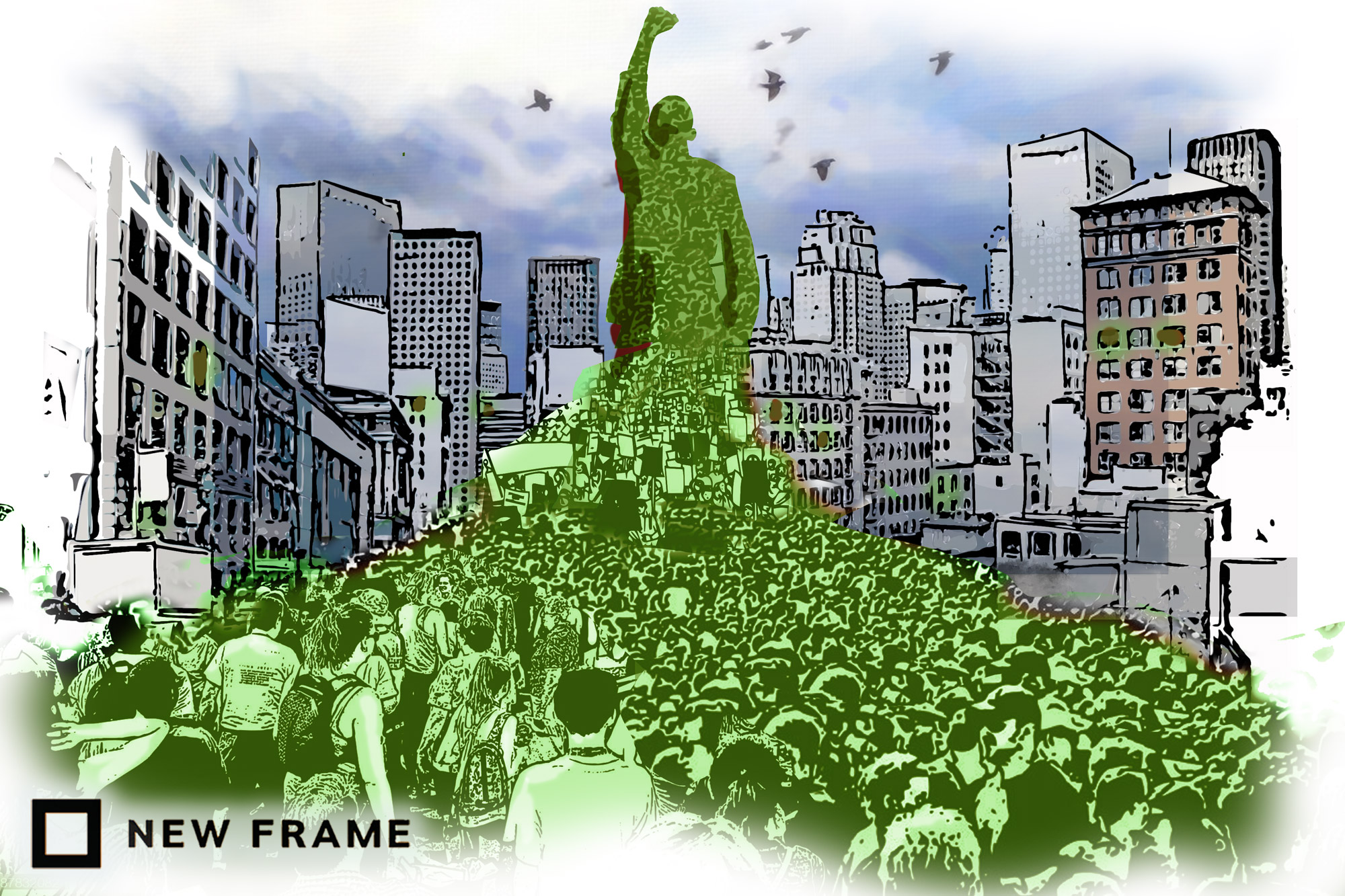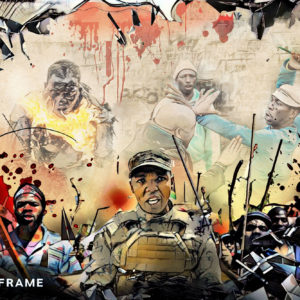The imperative of political hope
The widening separation between the nationalist imagination and emancipatory hopes is turning the former into an alibi for increasingly dangerous forms of reactionary politics.
Author:
8 April 2022

On the night of 6 April, a mob moved through Diepsloot in Johannesburg hammering on the doors of shacks and demanding residents’ papers. Arriving home from work, Elvis Mbhodazwe Nyathi, a father of four, hid behind his shack with his wife. They were seen and he fled for his life. He was captured by the mob, tied up, assaulted, stoned and set alight.
The following day the new national police commissioner, General Fannie Masemola, told the media that “the fact that there was someone who died does not mean the situation is out of control. We have deployed in this area, there are police, and we have made more than 25 arrests of illegal immigrants, so it is not to say the situation is out of control.” Heavily armed police officers returned to Diepsloot with home affairs officials that evening to go door to door checking papers.
The mob had assumed the role of the police. Now the police were continuing the work of the mob. This is how things usually unfold. The ANC and the state both typically respond to xenophobic street thuggery by taking on some of its language and sending in the police.
Related article:
It is not only Operation Dudula and the uniformed men claiming to be Umkhonto weSizwe veterans and performing acts of mindless thuggery in the streets of Durban in the days leading up to the brief imprisonment of Jacob Zuma who now have blood on their hands. Politicians such as Herman Mashaba, Gayton McKenzie, Aaron Motsoaledi and Julius Malema all carry responsibility for both the normalisation and escalation of xenophobic sentiment. We cannot shy away from the fact that, contrary to the relentless self-righteousness with which it presents itself as a principal democratic actor, the media is often complicit.
The depth of the social crisis that we inhabit does make it inevitable that people will push far beyond the limits of the liberal order. But there is nothing inevitable about this taking a xenophobic form. Already we can see that in the best organised parts of society – such as the industrial trade unions and the settlements and occupations where Abahlali baseMjondolo is strong – migrants are widely understood as fellow workers or residents and are often elected to positions of leadership. Democratic forms of organisation rooted in political identities forged around places of work and residence can certainly take inclusive forms in which the deep pain, fear and anger produced by the collapse of the social hope once articulated to the ANC and the state are expressed in vertical rather than horizontal forms of antagonism.
But the mere fact of organisation does not itself have a pregiven political character. Authoritarian forms of organisation rooted in nationalist ideas could well take the current crisis into new forms of horror. The growth of Operation Dudula is a terrifying prospect.
Lessons from an Amazon warehouse
The world watched last week as workers, many of them migrants, at an Amazon warehouse in New York built unity, took on the fifth richest company on the planet and won the battle to establish a union. Since then workers at more than 50 Amazon warehouses across the United States have contacted the new union with the aim of unionising their own workplaces.
The US has endured Donald Trump’s crude xenophobia, its continuation under Joe Biden – albeit in a more refined language – and the ravages of its heavily armed and ruthless policing of migration. Yet, in the midst of all this, workers born in the US and migrants built a union together. Brima Sylla, a migrant from Liberia who played a key role in the political work that preceded the victory over Amazon, explained that “Amazon doesn’t treat us like real human beings”. The resonance of this language with the ways of speaking that often characterise progressive forms of popular dissent here is striking.
Related article:
Sylla had acquired some organising experience through his work with the African Community Alliance of Staten Island and understood how to build unity between the migrants in the warehouse. These workers, he said, included “Senegalese, Nigerians, Liberians, Ghanaians, Algerians, Egyptians, Lebanese, Pakistanis, Albanians, Polish, Filipinos, Malaysians and a lot of Latinos”.
The starting point is to find points of commonality. “I talked with everybody – Africans, Chinese, Polish workers,” Sylla explained. “One Polish guy, I started by asking him about football – it turned out he used to play fullback. We had a conversation, and eventually I asked him what he thought about working at Amazon. He told me the pay was too low and that he had a lot of responsibilities because he had to take care of his elder parents, and it was really hard to do with $18.25 an hour. And when he told me he would vote yes on the union I realised we really had everybody on board.”
This is the kind of politics that can make things better for everyone. This is the kind of politics that can make a neighbour born in another country a comrade.
New forms of political imagination
Moving from the political failures that have dragged South Africa lower and lower over the past quarter of a century requires a decisive break from the capture of the language of a once emancipatory form of nationalism by opportunists and nascent fascists who place the migrant – largely the impoverished and working-class migrant from Asia and elsewhere in Africa – as the enemy.
This is a politics that will leave everyone poorer, debased, more traumatised and with less and less possibility of confronting the actual structures of oppression, including capital and a state that is partially an instrument of a predatory kleptocracy and partially an instrument of capital and a small set of oligarchs – including, we should not forget, the president’s family.
New forms of political imagination can emerge from the collective forms of shared suffering and deliberation that are enabled by day-to-day democratic organising. But this is slow work and ideas can also arrive more suddenly. Blaise Compaoré, the former president of Burkina Faso, was given a life sentence this week for his part in the assassination of his predecessor, Thomas Sankara, who was murdered, together with 12 others, during the coup d’état in 1987 that brought Compaoré to power.
Related article:
In his period in office, which lasted from August 1983 to October 1987, Sankara generated a set of visionary breaks from the status quo in his country, across Africa and in most of the world. He took radical positions on gender, health, housing, education, the environment, foreign “aid” and debt, and more, often making rapid achievements on a staggeringly large scale.
His project was always constrained by its initial political form. It didn’t assume state power through mass democratic organisation, and it certainly had its limits and contradictions. But for South Africans living under an utterly morally debased political class, the fact that he took actions such as selling off the government fleet of Mercedes that were used as the official cars for ministers and replacing them with Renault 5s, which were the cheapest cars available in Burkina Faso at the time, is simply astounding.
We do not have a single politician in our Parliament with anything like an emancipatory vision. We do have critically important nodes of democratic popular organisation that are, among other things, opposed to xenophobia. But they are not at the sort of scale that could enable effective contestation over our collective political imagination, let alone the material forces that have taken us into the horror of what happened in Diepsloot.
The imperative to think and organise against what could be, for a generation or more, the final end to the collective emancipatory hopes that carried us so far, but not far enough, could hardly be more urgent.



